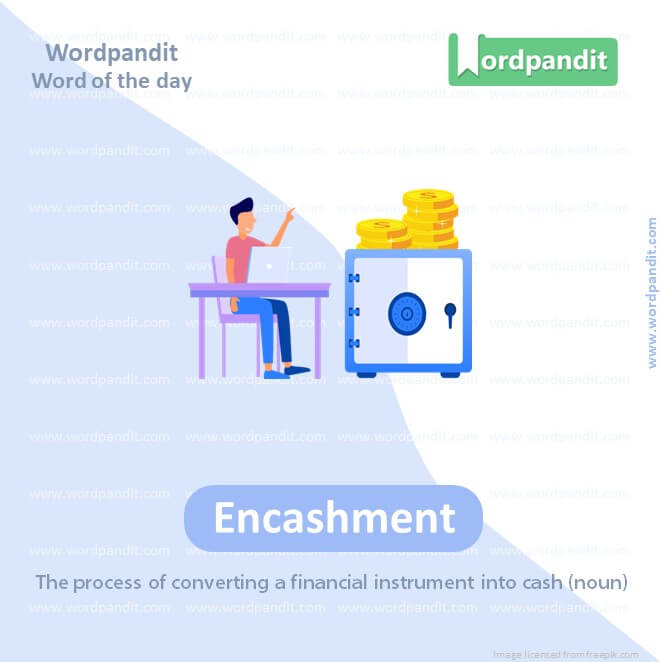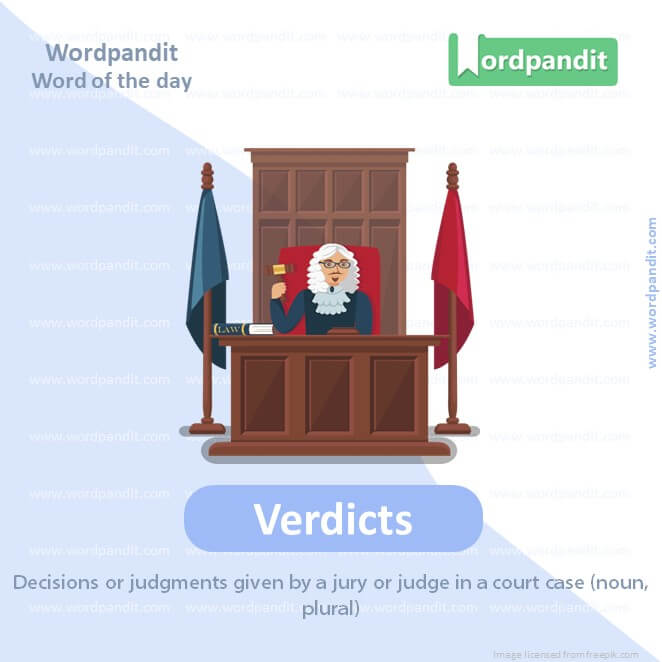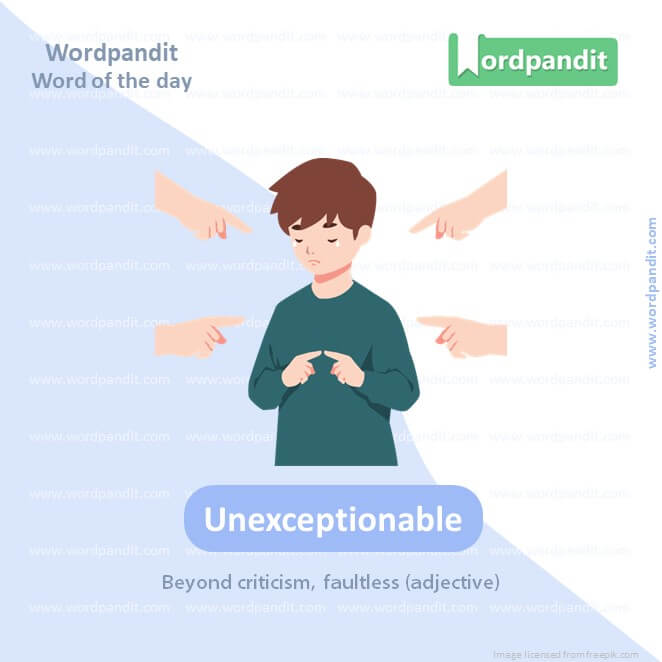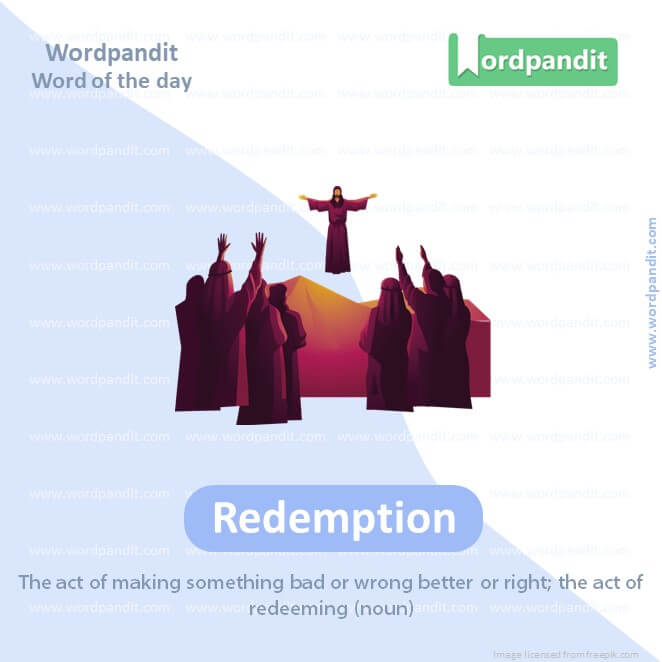Daily Vocabulary Words: List of Daily Used Words
Hi there. Welcome to this special section @ Wordpandit.
Our endeavour here is straightforward: highlighting important daily vocabulary words, you would encounter in The Hindu. This is your repository of commonly used words; essentially, we are posting a list of daily used words. Hence, this has significant practical application as it teaches you words that are commonly used in a leading publication such as The Hindu.
Visit the website daily to learn words from The Hindu.

WORD-1: Encashment
CONTEXT: In striking down the Electoral Bond Scheme (EBS) under which anyone could buy electoral bonds and donate them to political parties for encashment, the Supreme Court of India has recognised this malaise and struck a blow for democracy and transparency in political funding.
SOURCE: The Hindu
EXPLANATORY PARAGRAPH: Encashment is like when you have a special paper (like a check) that says you can get a certain amount of money, and you go to a place like a bank to exchange that paper for real money. It’s like turning a piece of paper into cash that you can use to buy things.
MEANING: The process of converting a financial instrument into cash (noun).
PRONUNCIATION: en-KASH-ment
SYNONYMS: Cashing, conversion, liquidation, realization, exchange
USAGE EXAMPLES:
1. She completed the encashment of her check at the local bank.
2. The encashment process for the bond took a few days.
3. He is waiting for the encashment of his travel cheques.
4. The bank charges a small fee for the encashment of foreign checks.
WORD-2: Manifestly
CONTEXT: It further found manifestly arbitrary, the amendment to the Companies Act that removed the cap of 7.5% of a company’s profit that can be donated to political parties without any requirement to disclose details of the recipient parties in its profit and loss accounts.
SOURCE: The Hindu
EXPLANATORY PARAGRAPH: Manifestly means something is very clear and easy to see, like when you know someone is happy because they are smiling really big. It’s like something that you don’t have to guess about because it’s so obvious.
MEANING: In a way that is clear or obvious to the eye or mind (adverb).
PRONUNCIATION: MAN-uh-fest-lee
SYNONYMS: Obviously, clearly, evidently, plainly, unmistakably
USAGE EXAMPLES:
1. She was manifestly excited about her birthday party.
2. The results were manifestly unfair.
3. It was manifestly obvious that he was telling the truth.
4. The problem was manifestly difficult to solve.

WORD-3: Verdicts
CONTEXT: It has also mandated disclosure of donation details since 2019. The judgment is one more in a long line of verdicts the Court has handed down to promote voter rights and preserve the purity of elections.
SOURCE: The Hindu
EXPLANATORY PARAGRAPH: Verdicts are like the answers from a group of people called a jury in a courtroom, who decide if someone did something wrong or not. It’s like when your teacher decides who was the best in a drawing competition.
MEANING: Decisions or judgments given by a jury or judge in a court case (noun, plural).
PRONUNCIATION: VER-dikts
SYNONYMS: Judgments, decisions, findings, rulings, conclusions
USAGE EXAMPLES:
1. The jury returned guilty verdicts on all counts.
2. She awaited the judge’s verdict nervously.
3. The verdicts in those cases have set important precedents.
4. The public was surprised by the verdicts handed down.

WORD-4: Unexceptionable
CONTEXT: The Court’s reasoning is unexceptionable. It found that the primary justification for the EBS — curbing the use of ‘black money’ for political or electoral funding by allowing donations through banking channels — failed the test of proportionality, as it was not the least restrictive measure to abridge the voters’ right to know.
SOURCE: The Hindu
EXPLANATORY PARAGRAPH: Unexceptionable is like when something is so good or right that nobody can find anything wrong with it. It’s like drawing a picture that everyone likes and no one says anything bad about.
MEANING: Beyond criticism, faultless (adjective).
PRONUNCIATION: un-ik-SEP-shuh-nuh-bul
SYNONYMS: Flawless, impeccable, perfect, faultless, unimpeachable
USAGE EXAMPLES:
1. Her conduct at school was unexceptionable.
2. The report was unexceptionable in its accuracy.
3. He provided unexceptionable references from previous employers.
4. The quality of the craftsmanship is unexceptionable.
WORD-5: Issuance
CONTEXT: The verdict may help ease the hold that donors may have on governance through money power, a question that arises is whether the validity of the scheme could have been decided earlier or the issuance of bonds on a regular basis stayed.
SOURCE: The Hindu
EXPLANATORY PARAGRAPH: Issuance is like when someone gives out something official, like a new set of rules or a special card. It’s like when your teacher hands out the test papers for everyone to fill out.
MEANING: The act of making something available or distributing something (noun).
PRONUNCIATION: ISH-oo-ance
SYNONYMS: Distribution, issuing, dispensation, release, provision
USAGE EXAMPLES:
1. The company announced the issuance of new stocks.
2. The government halted the issuance of travel visas.
3. The issuance of the new currency caused some confusion.
4. There was a delay in the issuance of the report.
WORD-6: Nativism
CONTEXT: Indonesia must avoid the trap of populist nativism of authoritarian rulers.
SOURCE: The Hindu
EXPLANATORY PARAGRAPH: Nativism is when people think that those who were born in a place should be treated better than people who moved there from somewhere else. It’s like saying only kids born in a playground can play there, not kids from other streets.
MEANING: The policy of protecting the interests of native-born or established inhabitants against those of immigrants (noun).
PRONUNCIATION: NAY-tiv-izm
SYNONYMS: Xenophobia, nationalism, chauvinism, ethnocentrism, jingoism
USAGE EXAMPLES:
1. Nativism influenced the country’s immigration policies.
2. The rise of nativism has been noted in several elections.
3. Policies reflecting nativism can impact community harmony.
4. He wrote a paper on the effects of nativism in urban areas.

WORD-7: Redemption
CONTEXT: Their conciliatory moves that followed the 2019 election paved the path to political redemption and renewal for Mr. Subianto, as he was transformed from Mr. Widodo’s rival
SOURCE: The Hindu
EXPLANATORY PARAGRAPH: Redemption is like making things right after doing something wrong. Imagine you accidentally broke a friend’s toy, and then you save up your allowance to buy them a new one. That’s like redemption because you’re fixing your mistake.
MEANING: The act of making something bad or wrong better or right; the act of redeeming (noun).
PRONUNCIATION: reh-DEMP-shun
SYNONYMS: Salvation, deliverance, rescue, liberation, atonement
USAGE EXAMPLES:
1. He sought redemption by apologizing to those he had wronged.
2. The story is about a criminal’s path to redemption.
3. She viewed her work in the community as a form of redemption.
4. Redemption was a central theme in the novel.

WORD-8: Persistence
CONTEXT: the persistence of populist political leadership, with echoes of the dictatorship era under Suharto, has vexed those who hoped for democracy to take deeper roots.
SOURCE: The Hindu
EXPLANATORY PARAGRAPH: Persistence is when you keep trying and trying, even when things are hard. It’s like when you’re learning to ride a bike and you fall off, but you get back up and try again until you can ride without falling.
MEANING: The quality of being persistent, or the act of persisting (noun).
PRONUNCIATION: per-SIS-tence
SYNONYMS: Determination, perseverance, tenacity, steadfastness, endurance
USAGE EXAMPLES:
1. Her persistence was rewarded when she finally solved the puzzle.
2. Persistence is key to learning a new skill.
3. Despite the challenges, he showed great persistence.
4. The persistence of the team led to their success.
WORD-9: Denigrating
CONTEXT: Mr. Subianto already has a reputation for pushing populist policies such as support for Islamist extremists and denigrating ethnic and religious minorities such as the Chinese and Christians.
SOURCE: The Hindu
EXPLANATORY PARAGRAPH: Denigrating is when someone says mean or belittling things about someone else or something. It’s like telling someone their drawing is ugly, which is not a nice thing to do.
MEANING: Criticizing unfairly; belittle (verb).
PRONUNCIATION: DEN-i-gray-ting
SYNONYMS: Disparage, belittle, demean, deprecate, diminish
USAGE EXAMPLES:
1. He was accused of denigrating his colleagues’ work.
2. The article denigrated the achievements of the team.
3. She felt denigrated by their comments about her performance.
4. Denigrating others is not a constructive way to give feedback.
WORD-10: Unsavoury
CONTEXT: There is also an unsavoury thread of nepotism favouring the elites within political circles, such as his bringing in Mr. Widodo’s 36-year-old son, Gibran Raka, as his running mate despite the latter falling short of the age threshold to run for high public office.
SOURCE: The Hindu
EXPLANATORY PARAGRAPH: Unsavoury is like something that is not nice or pleasant. It could be food that tastes bad or a place that feels scary. It’s like when you find something yucky or something you don’t want to be around.
MEANING: Disagreeable and unpleasant because morally disreputable (adjective).
PRONUNCIATION: un-SAV-uh-ree
SYNONYMS: Distasteful, unpleasant, disagreeable, offensive, unsuitable
USAGE EXAMPLES:
1. They found themselves in an unsavoury part of the city.
2. The scandal involved some unsavoury characters.
3. His remarks left an unsavoury impression on the audience.
4. She wanted to avoid unsavoury rumours.
Vocabulary SSC
Navigating the path to success in competitive examinations like the Staff Selection Commission (SSC) triggers a keen focus on ‘vocabulary SSC’. This collection of words, often prominent in SSC examinations, holds paramount importance, and forms a significant part of a candidate’s linguistic preparation. However, mastering ‘vocabulary SSC’ is a process that requires deliberate strategy and dedication.
To begin the journey with ‘vocabulary SSC’, a structured learning regime is key. Break the learning process into manageable chunks. Concentrate on a set number of words each day. This steady, consistent approach reduces the risk of burnout and enhances long-term retention of vocabulary.
The strategic use of memory aids can significantly boost the learning of ‘vocabulary SSC’. Utilize flashcards, memory apps, or even create personal mnemonics to help remember each word and its meaning more effectively. Associating a word to a personal event or object creates a lasting mental connection, making recall easier.
To truly master ‘vocabulary SSC’, it’s crucial to engage with the words in different contexts. Incorporating the words into daily reading and writing practices provides exposure to their usage in varied situations. This practical application reinforces the understanding of ‘vocabulary SSC’, enhancing the ability to employ these words accurately in the exam setting.
Regular revision is a must when preparing ‘vocabulary SSC’. Spaced repetition, interspersing the study with regular breaks, and regularly revisiting the words learned, ensures the words stay firm in your memory, ready to use when needed.
In essence, preparing ‘vocabulary SSC’ is an exercise in action-oriented constant learning. Strategic use of learning tools, practical application, and regular revision are key aspects of getting a grip on ‘vocabulary SSC’. As you stride through this process, you inch closer to acing your SSC examinations with an enriched vocabulary and boosted confidence.













